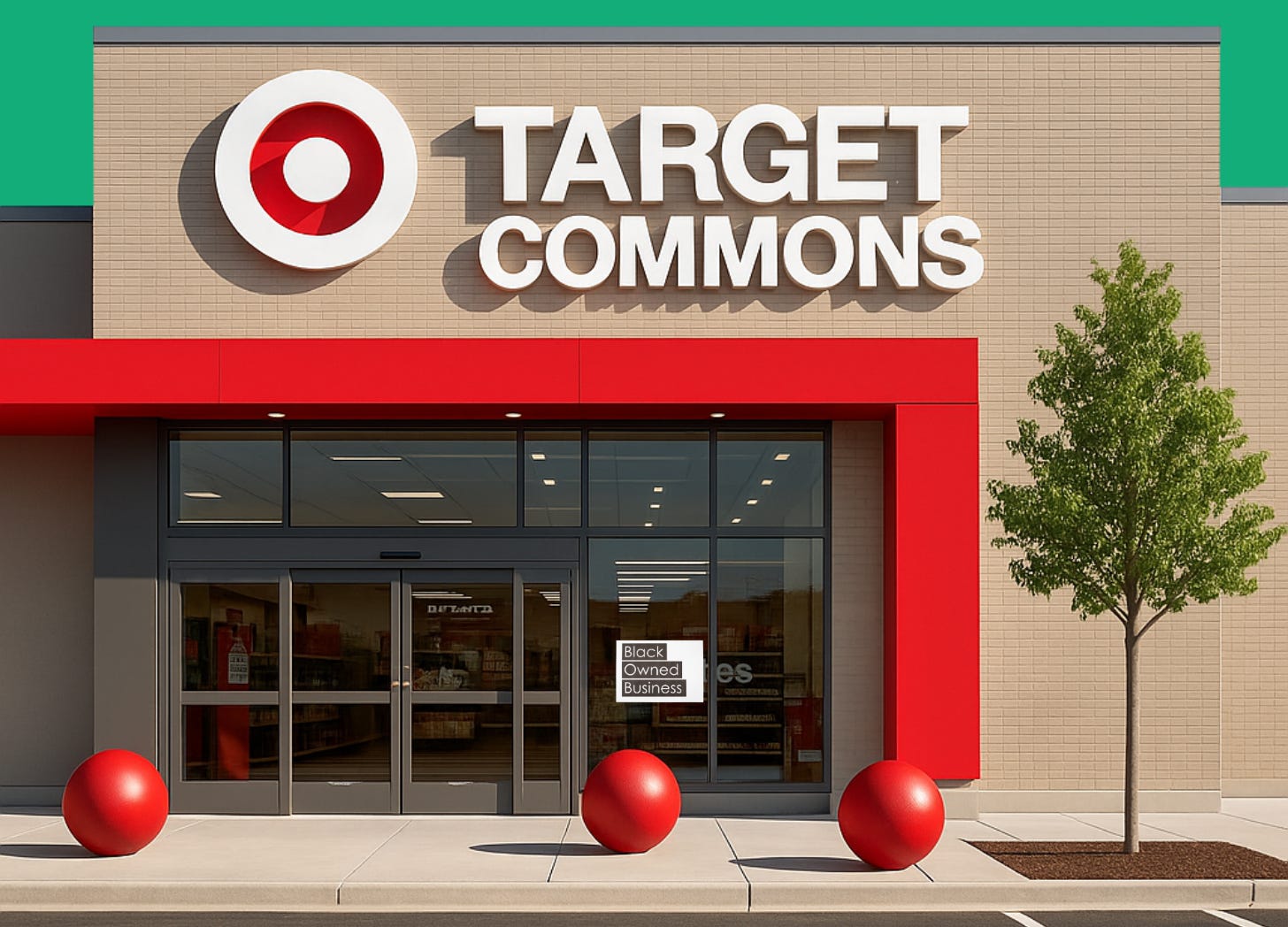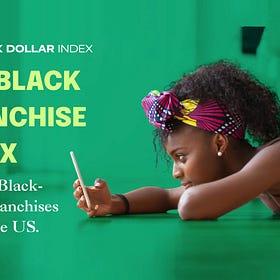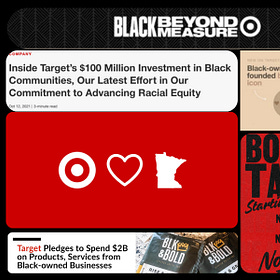4 Ways Target Can Rebuild Black Consumer Trust
And a bold concept that delivers on community-centered equity
Target is trying to win back Black consumers — real bad.
Cutting a $300K check to the National Baptist Convention
Sponsoring the 2025 Essence Festival, where they reportedly gave a $75,000 grant to Second Harvest and a $25,000 grant to Total Community Action (TCA) to ensure “smooth logistics” and “wide-reaching distribution” of meal kits for families across New Orleans.
Partnering with viral Twitch streamer Kai Cenat on his product launch.
But none have sparked the cultural resonance or trust Target once had.
And while they’ve been throwing spaghetti at the wall and seeing what sticks, I’ve been having various convos with friends and colleagues about what it would actually take to get Black consumers back to Target.
The most common and immediate response:
I’m not here to demand a return to 2020 or reinstatement of DEI. Target can’t (and won’t) go back — but that doesn’t mean it can’t move forward with intention.
I had a few ideas with one of them being the BIG systemic shift needed to turn things around for both Target and Black communities.
Wanna hear it, here it go:
#1. Transparency on Black Commitments
In 2021, Target pledged to spend $2 billion with Black-owned businesses by 2025. One update followed in 2022 — a vague statement that it was “on track.” Then? Silence. UNTIL…their announcement in January 2025 that they were eliminating key DEI initiatives.
After a series of meetings between Reverend Al Sharpton, Pastor Jamal H. Bryant, and Target CEO Brian Cornell, Target announced that they would re-commit to spending the full $2 billion with Black-owned businesses.
In a recent open letter via Essence, Target’s CEO wrote:
This year, we will complete our commitment to invest $2 billion in Black-owned businesses, more than doubling the number of Black-owned brands on our shelves. Through our Accelerator program, we’ve supported more than 500 entrepreneurs, helping them scale and succeed in retail.
We’re completing our $100 million investment in Black-led community organizations, including the Northside Economic Opportunity Network in our hometown of Minneapolis, the Russell Innovation Center for Entrepreneurs in Atlanta, and the PENSOLE Lewis College of Business and Design, the first reinstated HBCU which offers free tuition to aspiring designers, engineers, and business leaders – among many more.
We’ve also expanded access to education and opportunity, supporting thousands of students at over 20 HBCUs and providing tuition assistance to more than 30,000 team members through our Dream to Be program.
But what’s still missing? A clear, itemized breakdown of how that money was spent:
What brands went through the accelerator?
How many made it to Target shelves?
Actual economic impact
What to do:
Target should publish a detailed, easy-to-digest report — the kind consumers and partners can point to and track. And make it an annual update, not just a one-time statement.
Why it matters:
General progress reports sound like PR and after two years of silence, we need more than a paragraph in a festival recap.
#2. Visible (and Audible) Leadership
Over the past few months, you may feel like you’ve heard more about Target than you’ve heard from Target. And that’s fair.
— Brian Cornell, Target CEO via Essence
Target’s current CEO has met with civil rights leaders behind closed doors, but again, outside of that…silence until recently. We also haven’t really heard from any Black leadership. What we DID hear back in May is that Target fired two women executives who were a part of the Racial Equity Action and Change committee (REACH) or supporting the corporation’s DEI efforts.
What to do:
Feature Black executives in visible, strategic roles
Let leadership speak directly to consumers — not just civil rights leaders behind closed doors
Empower Black team members to lead on sustainability, culture, and community investment
Why it matters: When the only public updates are firings from the DEI ranks and the CEO stays behind closed doors, it signals retreat. Silence and a lack of visible Black decision-makers doesn’t build consumer confidence.
Ok, this is where I really got in my bag. Hear me out…
#3. Build an Ownership Model: Target as a Franchisor
Corporations decide to become franchisors when they see a viable path to rapid expansion and increased profitability by leveraging the capital and local market knowledge of franchisees. This decision involves assessing whether the business model is replicable, demand exists in other markets, and the company can provide adequate support and oversight.
I’ve been thinking more about franchising with the launch of the new Black Franchise Index — this is where Target could lead boldly.
Imagine a network of smaller Target concept stores — we’ll call them Target Commons — focused entirely on everyday essentials like food, baby care, hygiene, and medicine — located in underserved communities. Now imagine they’re able to be franchised by Black entrepreneuers and supported with operational and marketing infrastructure.
Black-owned franchises generate over twice the revenue of Black-owned independent businesses on average.
Source: Oxford Economics
These stores would provide the much needed pathway to ownership and alternatives to Dollar General, Family Dollar, and other similar stores that provide essentials, but lack price parity and healthy food options.
What to do:
Pilot a Target Commons Franchise Program
Provide access to capital and training for underrepresented franchisees
Ensure stores prioritize both affordability and community wealth
Why it matters:
Franchising is one of the most clear paths to business ownership
Predatory retail has long extracted from our communities — this helps change that.
Target has the brand equity and revenue to scale it — it just needs the will.
#4. Time.
That’s it. It takes time to turn a big ship. No one expects Target to rebuild trust overnight. But that doesn’t mean you go quiet while you’re doing the work.
What to do:
Keep making investments. Report them transparently. Show that even without a formal DEI program, progress is still possible — and still happening.
Why it matters:
Consistency builds credibility. And right now, Black consumers are watching.
Black consumers don’t need Target to go back to 2020. We need it to meet the moment we’re in.
It’s time for brands to understand: the new DEI is shared value. And if our transactions are one-way, we won’t be doing business with you.
Disclaimer:
The Target Commons franchise concept outlined here is an independent, editorial idea developed by the Black Dollar Index (BDI) for thought-leadership and illustrative purposes only. It is not affiliated with, endorsed by, or proposed in partnership with Target Corporation. This concept is intended to spark dialogue around equitable ownership models and corporate accountability, and does not reflect any current or planned initiatives by Target or its subsidiaries.
And Target, if you want to build it, let’s talk 🖤💚
ICYMI
Introducing the Black Franchise Index
When we talk about Black-owned businesses and Black economic power, franchising often gets left out of the conversation — even though it’s one of the clearest paths to business ownership in America. The Black Franchise Index changes that.
From Black To Boycott: Did Target Deliver on Its 5-Year Promises Before Tapping Out?
“Do not introduce me to a vibe you cannot maintain.”
Be informed.
Check out the Black Dollar Index Shop for merch that goes towards our mission to create a more equitable relationship between corporations and Black communities.
The Black Dollar Initiative is the independent 501(c)(3) research and advocacy hub that supports the Black Dollar Index. Your donation will go towards creating a more equitable relationship between corporations and our communities. Donations are tax-deductible (EIN: 85-2383485).










My personal boycott continues. I won’t be returning. Are we not getting the message? Black people have no allies. Corporate America is now showing its true colors. Let’s help Black people keep, invest, and grow their dollars.
Instead of chasing Target, the African-American consumer may wish to rally in support of Costco, the stock of which has been in free fall since the company doubled down on refusing to buckle under the pressure to scrap DEI.
Investment in shares of Costco and shopping at their warehouses might help.